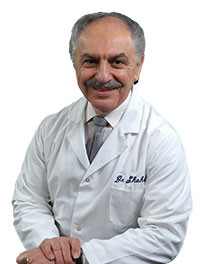Body Dysmorphic Disorder Treatment in Hackensack, NJ

What Is Body Dysmorphia?
Body dysmorphic disorder (BDD), also referred to as body dysmorphia, is a type of obsessive-compulsive disorder that causes individuals to continuously worry about a perceived defect in their appearance. Affected individuals may obsess over issues such as their weight and body shape or have an obsession with certain body parts, particularly related to their face or head. While a minor physical abnormality may be present, the concern is often grossly exaggerated in one's mind. BDD is driven by repetitive and compulsive behaviors that are intended to fix, hide, inspect, or obtain reassurance about the disliked body parts. On average, these behaviors can consume 3-8 hours of every day.
The obsessive and repetitive behaviors associated with BDD can create significant stress for affected individuals and can impact daily functioning and quality of life. Major depression, as well as suicidal thoughts and behavior, are also very common in body dysmorphic disorder.
If you or a loved one are suffering from body image dysmorphia, it is important to seek the care of an experienced healthcare provider. To schedule a consultation with a practitioner in Hackensack who specializes in body dysmorphic disorder treatment, call (201) 806-6099 or contact Dr. M.T. Shahab online.
Body Dysmorphia Causes
Body dysmorphic disorder typically begins in the early teen years or, in some cases, as early as childhood. Individuals with BDD often have a history of childhood trauma including neglect or child abuse. A family history of a parent or sibling with an anxiety disorder may also be present.
Individuals suffering from BDD may also be struggling with an anxiety disorder , personality disorder, eating disorder , depression, or substance abuse.
Some studies have shown that BDD may be genetic—people with blood relatives that have BDD or obsessive-compulsive disorder have an increased risk of developing body dysmorphia.
Body Dysmorphia Symptoms
Individuals with BDD spend an excessive amount of time thinking about and trying to improve or hide perceived flaws. This obsession with their appearance often leads to compulsive or repetitive behaviors. The most frequently reported body dysmorphia symptoms which result from this obsession include:
- Camouflaging (hiding or covering up a disliked body area)
- Comparing disliked body features to those of other people
- Shopping to improve the appearance of disliked body parts
- Checking the mirror or, alternatively, avoiding it altogether
- Excessive grooming, tanning, or exercising
- Skin picking
- Frequently changing clothes
- Constantly seeking reassurance
- Seeking cosmetic surgery or other cosmetic procedures
Regardless of the numerous steps that are taken to improve their appearance, BDD sufferers remain unhappy.
Making a BDD Diagnosis & Treatment Options
Diagnosis of body dysmorphic disorder is typically based on a psychological evaluation that assesses behaviors related to a negative self-image, as well as an evaluation of one's personal and family history. A diagnosis can be made if symptoms that are listed in the Diagnostic and Statistical Manual of Mental Disorders (DSM-5), published by the American Psychiatric Association, are present.
Effective treatment options are available for those suffering from BDD and include psychotherapy and medications. The goal of treatment is to improve daily functioning and quality of life while decreasing stress, anxiety, and compulsive behaviors related to appearance.
- Cognitive Behavioral Therapy (CBT): As a BDD therapy that helps to improve self-esteem, CBT helps patients recognize and change negative thinking patterns. It helps people focus on the big picture rather than obsessing over small details related to one’s appearance. CBT also helps to relieve repetitive behaviors that are trigged by BDD and can help people heal from childhood trauma as well as anxiety, depression, substance abuse, or other overlapping issues.
- Medication: Selective serotonin reuptake inhibitors (SSRIs), which are often prescribed to treat anxiety and depression, can be used to help reduce obsessive thoughts and repetitive behaviors associated with BDD.
Body dysmorphia treatment is tailored to the individual. In mild to moderate cases, only one of the above treatments may be utilized. In more severe cases, many healthcare practitioners recommend a combination of treatments.
Shame and embarrassment often prevent people with BDD from seeking professional help. In the majority of cases, BDD does not improve on its own and, if left untreated, may worsen over time and can contribute to anxiety, depression, and suicidal thoughts and behavior. If signs and symptoms of BDD are present, effective treatment options are available to help those suffering from this condition improve their mental wellbeing and quality of life.
Meet with a healthcare practitioner in Hackensack who can help teach you how to overcome body dysmorphia. Call (201) 806-6099 or contact Dr. M.T. Shahab online.
Medwell Orthopedics & Functional Medicine for Men & Women
Address
33 Central AveMidland Park, NJ 07432
(201) 806-6099
www.BergenCountyDoctors.com
Hours
Mon:
8:00 am - 8:00 pm
Tue:
2:00 pm - 7:00 pm
Wed:
8:00 am - 6:30 pm
Thu:
8:00 am - 1:00 pm
Fri:
8:00 am - 6:30 pm
Sat:
9:00 am - 1:00 pm
Sun:
By Appointment Only


